- Home
- John le Carré
A Murder of Quality Page 4
A Murder of Quality Read online
Page 4
‘He followed the prints round until he came to the conservatory. It was darker in there and he fumbled for the light switch, but it didn’t work.’
‘Did he light a match?’
‘No, he didn’t have any. He’s a non-smoker. His wife didn’t approve of smoking. He moved forward from the door. The conservatory walls are mainly glass except for the bottom three feet, but the roof is tiled. The moon was high that night, and not much light got in at all, except through the partition window between the drawing-room and the conservatory – but she’d only had the little table light on in the drawing-room. So he groped his way forward, talking all the time, calling Stella, his wife. As he went, he tripped over something and nearly fell. He knelt down and felt with his hands, up and down her body. He realised that his hands were covered in blood. He doesn’t remember much after that, but there’s a senior master living a hundred yards up the road – Mr D’Arcy his name is, lives with his sister – and he heard him screaming on the road. D’Arcy went out to him. Rode had blood all over his hands and face and seemed to be out of his mind. D’Arcy rang the police and I got there at about one o’clock that morning. I’ve seen some nasty things in my time, but this is the worst. Blood everywhere. Whoever killed her must have been covered in it. There’s an outside tap against the conservatory wall. The tap had been turned on, probably by the murderer to rinse his hands. The boffins have found traces of blood in the snow underneath it. The tap was lagged recently by Rode, I gather …’
‘And fingerprints?’ Smiley asked. ‘What about them?’
‘Mr Rode’s were everywhere. On the floor, the walls and windows, on the body itself. But there were other prints; smudges of blood, little more, made with a gloved hand probably.’
‘And they were the murderer’s?’
‘They had been made before Rode made his. In some cases Rode’s prints were partly superimposed on the glove-prints.’
Smiley was silent for a moment.
‘These examination papers he went back for. Were they as important as all that?’
‘Yes. I gather they were. Up to a point anyway. The marks had to be handed in to Mr D’Arcy by midday on Friday.’
‘But why did he take them to Fielding’s in the first place?’
‘He didn’t. He’d been invigilating exams all afternoon and the papers were handed in to him at six o’clock. He put them in his little case and had them taken to Fielding’s by a boy – head boy in Mr Fielding’s house, name of Perkins. Rode was on Chapel Duty this week, so he didn’t have time to return home before dinner.’
‘Where did he change then?’
‘In the Tutors’ Robing Room, next to the Common Room. There are facilities there, mainly for games tutors who live some distance from Carne.’
‘The boy who brought this case to Fielding’s house – who was he?’
‘I can’t tell you much more than I’ve said. His name is Perkins; he’s Head of Mr Fielding’s house. Fielding has spoken to him and confirmed Rode’s statement … House tutors are very possessive about their boys, you know … don’t like them to be spoken to by rough policemen.’ Rigby seemed to be slightly upset.
‘I see,’ Smiley said at last, helplessly, and then: ‘But how do you explain the letter?’
‘It isn’t only the letter we’ve got to explain.’
Smiley looked at him sharply.
‘What do you mean?’
‘I mean,’ said Rigby slowly, ‘that Mrs Rode did several pretty queer things in the last few weeks.’
4 Town and Gown
‘Mrs Rode was Chapel, of course,’ Rigby continued, ‘and we’ve quite a community in Carne. Truth to tell,’ he added with a slow smile, ‘my wife belongs to it.
‘A couple of weeks ago our Minister called round to see me. It was in the evening, about half past six, I suppose. I was just thinking of going home, see. He walked in here and sat himself down where you’re sitting now. He’s a big fellow, the Minister, a fine man; comes from up North, where Mrs Rode came from. Cardew, his name is.’
‘The Mr Cardew in the letter?’
‘That’s him. He knew all about Mrs Rode’s family before the Rodes ever came here. Glaston’s quite a name up North, and Mr Cardew was very pleased when he heard that Stella Rode was Mr Glaston’s daughter; very pleased indeed. Mrs Rode came to the Tabernacle regular as clockwork, you can imagine, and they like to see that round here. My wife was pleased as Punch, I can tell you. It was the first time, I suppose, that anyone from the School had done that. Most of the Chapel people here are tradespeople – what we call the locals.’ Rigby smiled again. ‘It isn’t often that Town and Gown come together, so to speak. Not here.’
‘How about her husband? Was he Chapel too?’
‘Well, he had been, so she told Mr Cardew. Mr Rode was born and bred in Branxome, and all his family were Chapel people. That’s how Mr and Mrs Rode first met, I gather – at Branxome Tabernacle. Ever been there, have you? A fine church, Branxome, right up on the hill there, overlooking the sea.’
Smiley shook his head and Rigby’s wide brown eyes rested on him thoughtfully for a moment.
‘You should,’ he said, ‘you should go and see that. It seems,’ he continued, ‘that Mr Rode turned Church of England when he came to Carne. Even tried to persuade his wife to do the same. They’re very strong at the School. I heard that from my wife, as a matter of fact. I never let her gossip as a rule, being a policeman’s wife and that, but Mr Cardew told her that himself.’
‘I see,’ said Smiley.
‘Well now, Cardew came and saw me. He was all worried and bothered with himself. He didn’t know what he should make of it, but he wanted to talk to me as a friend and not as a policeman.’ Rigby looked sour: ‘When people say that to me, I always know that they want to talk to me as a policeman. Then he told me his story. Mrs Rode had called to see him that afternoon. He’d been out visiting a farmer’s wife over in Okeford and didn’t come home until half past five or thereabouts, so Mrs Cardew had had to talk to her and hold the fort until the Minister came home. Mrs Rode was white as a sheet, sitting very still by the fire. As soon as the Minister arrived, Mrs Cardew left them alone and Stella Rode started talking about her husband.’
He paused. ‘She said Mr Rode was going to kill her. In the long nights. She seemed to have a kind of fixation about being murdered in the long nights. Cardew didn’t take it too seriously at first, but thinking about it afterwards, he decided to let me know.’
Smiley looked at him sharply.
‘He couldn’t make out what she meant. He thought she was out of her mind. He’s a down-to-earth man, see, although he’s a Minister. I think he was probably a bit too firm with her. He asked her what put this dreadful thought into her head, and she began to weep. Not hysterical, apparently, but just crying quietly to herself. He tried to calm her down, promised to help her any way he could, and asked her again what had given her this idea. She just shook her head, then got up, walked over to the door, still shaking her head in despair. She turned to him, and he thought she was going to say something, but she didn’t. She just left.’
‘How very curious,’ said Smiley, ‘that she lied about that in her letter. She went out of her way to say she hadn’t told Cardew.’
Rigby shrugged his great shoulders.
‘If you’ll pardon me,’ he said. ‘I’m in a darned awkward position. The Chief Constable would sooner cut his throat than call in Scotland Yard. He wants an arrest and he wants one quick. We’ve got enough clues to cover a Christmas tree; footprints, time of the murder, indication of murderer’s clothing, and even the weapon itself.’
Smiley looked at him in surprise.
‘You’ve found the weapon, then?’
Rigby hesitated. ‘Yes, we’ve found it. There’s hardly a soul knows this, sir, and I’ll trouble you to remember that. We found it the morning after the murder, four miles north of Carne on the Okeford road, tossed into a ditch. Eighteen inches of what they call coaxial
cable. Know what that is, do you? It comes in all sizes, but this piece is about two inches in diameter. It has a copper rod running down the middle and plastic insulation between the rod and the outer cover. There was blood on it: Stella Rode’s blood group, and hairs from her head, stuck to the blood. We’re keeping that very dark indeed. By the Grace of God, it was found by one of our own men. It pinpoints the line of the murderer’s departure.’
‘There’s no doubt, I suppose, that it is the weapon?’ Smiley asked lamely.
‘We found particles of copper in the wounds on the body.’
‘It’s odd, isn’t it,’ Smiley suggested reflectively, ‘that the murderer should have carried the weapon so far before getting rid of it? Specially if he was walking. You’d think he’d want to get rid of it as soon as he could.’
‘It is odd. Very odd. The Okeford road runs beside the canal for half of those four miles; he could have pitched the cable into the canal anywhere along there. We’d never have been the wiser.’
‘Was the cable old?’
‘Not particularly. Just standard type. It could have come from almost anywhere.’ Rigby hesitated a minute, then burst out:
‘Look, sir, this is what I am trying to say. The circumstances of this case demand a certain type of investigation: wide-scale search, detailed laboratory work, mass inquiry. That’s what the Chief wants, and he’s right. We’ve no case against the husband at all, and to be frank he’s precious little use to us. He seems a bit lost, a bit vague, contradicting himself on little things that don’t matter, like the date of his marriage or the name of his doctor. It’s shock, of course, I’ve seen it before. I know all about your letter, sir, and it’s damned odd, but if you can tell me how he could have produced Wellington boots out of a hat and got rid of them afterwards, battered his wife to death without leaving more than a few smudges of blood on himself, and got the weapon four miles from the scene of the crime, all within ten minutes of being at Fielding’s house, I’ll be grateful to you. We’re looking for a stranger, six foot tall, wearing newish Dunlop Wellington boots size 10½, leather gloves and an old blue overcoat stained with blood. A man who travels on foot, who was in the area of North Fields between 11.10 and 11.45 on the night of the murder, who left in the direction of Okeford, taking with him one and a half feet of coaxial cable, a string of green beads and an imitation-diamond clip, valued at twenty-three and six. We’re looking for a maniac, a man who kills for pleasure or the price of a meal.’ Rigby paused, smiled wistfully and added, ‘Who can fly fifty feet through the air? But with information like this how else should we spend our time? What else can we look for? I can’t put men on to chasing shadows when there’s work like that to be done.’
‘I understand that.’
‘But I’m an old policeman, Mr Smiley, and I like to know what I’m about. I don’t like looking for people I can’t believe in, and I don’t like being cut off from witnesses. I like to meet people and talk to them, nose about here and there, get to know the country. But I can’t do that, not at the school. Do you follow me? So we’ve got to rely on laboratories, tracker dogs, and nation-wide searches, but somehow in my bones I don’t think it’s altogether one of those cases.’
‘I read in the paper about a woman, a Mad Janie …’
‘I’m coming to that. Mrs Rode was a kindly woman, easy to talk to. I always found her so, anyway. Some of the women at Chapel took against her, but you know what women are. It seems she got friendly with this Janie creature. Janie came begging, selling herbs and charms at the back door; you know the kind of thing. She’s queer, talks to birds and all that. She lives in a disused Norman chapel over Pylle way. Stella Rode used to give her food and clothes – the poor soul was often as not half-starved. Now Janie’s disappeared. She was seen early Wednesday night on the lane towards North Fields and hasn’t been seen since. That don’t mean a thing. These people come and go in their own way. They’ll be all over the neighbourhood for years, then one day they’re gone like snow in the fire. They’ve died in a ditch, maybe, or they’ve took ill and crept away like a cat. Janie’s not the only queer one round here. There’s a lot of excitement because we found a spare set of footprints running along the fringe of trees at the far end of the garden. They were a woman’s prints by the look of them, and at one point they come quite close to the conservatory. Could be a gypsy or a beggar woman. Could be anything, but I expect it’s Janie right enough. I hope to Heaven it was, sir; we could do with an eyewitness, even a mad one.’
Smiley stood up. As they shook hands, Rigby said, ‘Goodbye, sir. Ring me any time, any time at all.’ He scribbled a telephone number on the pad in front of him, tore off the sheet and gave it to Smiley. ‘That’s my home number.’ He showed Smiley to the door, seemed to hesitate, then he said, ‘You’re not a Carnian yourself by any chance, are you, sir?’
‘Good heavens, no.’
Again Rigby hesitated. ‘Our Chief’s a Carnian. Ex-Indian Army. Brigadier Havelock. This is his last year. He’s very interested in this case. Doesn’t like me messing round the school. Won’t have it.’
‘I see.’
‘He wants an arrest quickly.’
‘And outside Carne, I suppose?’
‘Good-bye, Mr Smiley. Don’t forget to ring me. Oh, another thing I should have mentioned. That bit of cable …’
‘Yes?’
‘Mr Rode used a length of the same stuff in a demonstration lecture on elementary electronics. Mislaid it about three weeks ago.’
Smiley walked slowly back to his hotel.
My dear Brim,
As soon as I arrived I handed your letter over to the CID man in charge of the case – it was Rigby, as Ben had supposed: he looks like a mixture of Humpty-Dumpty and a Cornish elf – very short and broad – and I don’t think he’s anyone’s fool.
To begin at the middle – our letter didn’t have quite the effect we expected; Stella Rode evidently told Cardew, the local Baptist Minister, two weeks ago, that her husband was trying to kill her in the long nights, whatever they are. As for the circumstances of the murder – the account in the Guardian is substantially correct.
In fact, the more Rigby told me, the less likely it became that she was killed by her husband. Almost everything pointed away from him. Quite apart from motive, there is the location of the weapon, the footprints in the snow (which indicate a tall man in Wellingtons), the presence of unidentified glove-prints in the conservatory. Add to that the strongest argument of all: whoever killed her must have been covered in blood – the conservatory was a dreadful sight, Rigby tells me. Of course, there was blood on Rode when he was picked up by his colleague in the lane, but only smears which could have resulted from stumbling over the body in the dark. Incidentally, the footprints only go into the garden and not out.
As things stand at the moment, there is, as Rigby points out, only one interpretation – the murderer was a stranger, a tramp, a madman perhaps, who killed her for pleasure or for her jewellery (which was worthless) and made off along the Okeford road, throwing the weapon into a ditch. (But why carry it four miles – and why not throw it into the canal the other side of the ditch? The Okeford road crosses Okemoor, which is all cross-dyked to prevent flooding.) If this interpretation is correct, then I suppose we attribute Stella’s letter and her interview with Cardew to a persecuted mind, or the premonition of death, depending on whether we’re superstitious. If that is so, it is the most monstrous coincidence I have ever heard of. Which brings me to my final point.
I rather gathered from what Rigby didn’t say that his Chief Constable was treading on his tail, urging him to scour the country for tramps in bloodstained blue overcoats (you remember the belt). Rigby, of course, has no alternative but to follow the signs and do as his Chief expects, but he is clearly uneasy about something – either something he hasn’t told me, or something he just feels in his bones. I think he was sincere when he asked me to tell him anything I found out about the School end – the Rodes themselves, the w
ay they fitted in, and so on. Carne’s monastery walls are still pretty high, he feels …
So I’ll just sniff around a bit, I think, and see what goes on. I rang Fielding when I got back from the police station and he’s asked me to supper tonight. I’ll write again as soon as I have anything to tell you.
George
Having carefully sealed the envelope, pressing down the corners with his thumbs, Smiley locked his door and made his way down the wide marble staircase, treading carefully on the meagre coconut matting that ran down the centre. There was a red wooden letter box in the hall for the use of residents, but Smiley, being a cautious man, avoided it. He walked to the pillar-box at the corner of the road, posted his letter and wondered what to do about lunch. There were, of course, the sandwiches and coffee provided by Miss Brimley. Reluctantly he returned to the hotel. It was full of journalists, and Smiley hated journalists. It was also cold, and he hated the cold. And there was something very familiar about sandwiches in a hotel bedroom.
5 Cat and Dog
It was just after seven o’clock that evening when George Smiley climbed the steps which led up to the front door of Mr Terence Fielding’s house. He rang, and was admitted to the hall by a little plump woman in her middle fifties. To his right a log fire burned warmly on a pile of wood ash and above him he was vaguely aware of a minstrel gallery and a mahogany staircase, which rose in a spiral to the top of the house. Most of the light seemed to come from the fire, and Smiley could see that the walls around him were hung with a great number of paintings of various styles and periods, and the chimney-piece was laden with all manner of objets d’art.With an involuntary shudder, he noticed that neither the fire nor the pictures quite succeeded in banishing the faint smell of school – of polish bought wholesale, of cocoa and community cooking. Corridors led from the hall, and Smiley observed that the lower part of each wall was painted a dark brown or green according to the inflexible rule of school decorators. From one of these corridors the enormous figure of Mr Terence Fielding emerged.

 The Honorable Schoolboy
The Honorable Schoolboy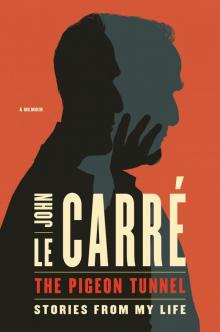 The Pigeon Tunnel: Stories From My Life
The Pigeon Tunnel: Stories From My Life Single & Single
Single & Single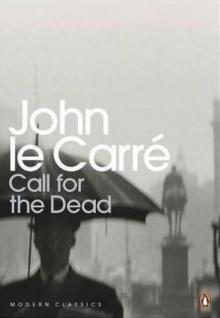 The Spy Who Came in From the Cold
The Spy Who Came in From the Cold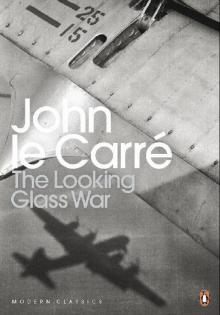 The Looking Glass War
The Looking Glass War The Night Manager
The Night Manager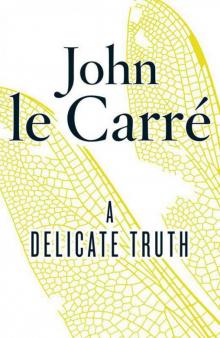 A Delicate Truth
A Delicate Truth A Perfect Spy
A Perfect Spy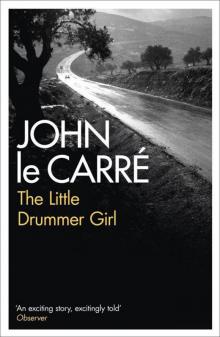 The Little Drummer Girl
The Little Drummer Girl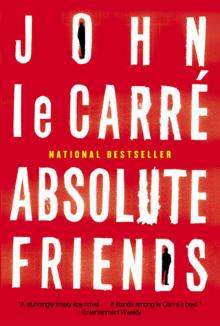 Absolute Friends
Absolute Friends A Murder of Quality AND Call for the Dead
A Murder of Quality AND Call for the Dead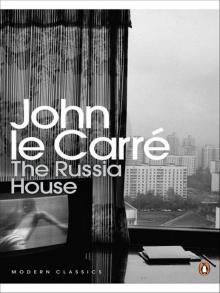 The Russia House
The Russia House The Tailor of Panama
The Tailor of Panama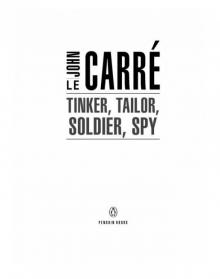 Tinker, Tailor, Soldier, Spy
Tinker, Tailor, Soldier, Spy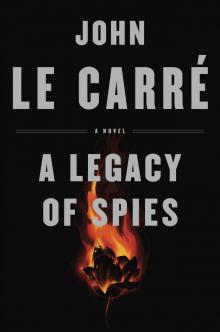 A Legacy of Spies
A Legacy of Spies The Mission Song
The Mission Song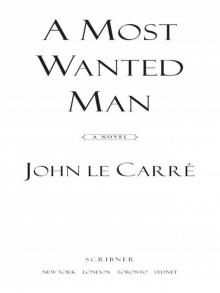 A Most Wanted Man
A Most Wanted Man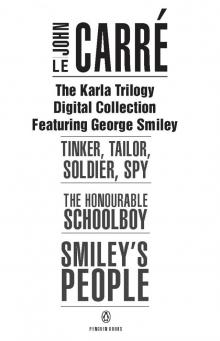 John Le Carré: Three Complete Novels
John Le Carré: Three Complete Novels The Secret Pilgrim
The Secret Pilgrim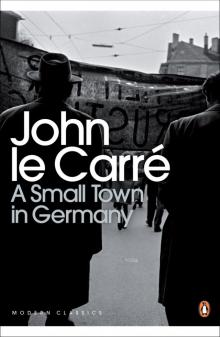 A Small Town in Germany
A Small Town in Germany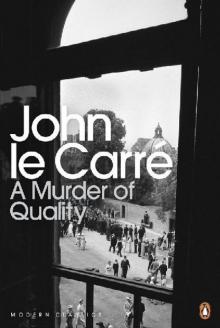 A Murder of Quality
A Murder of Quality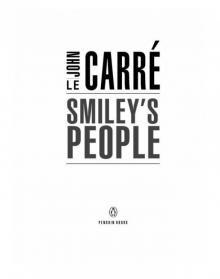 Smiley's People
Smiley's People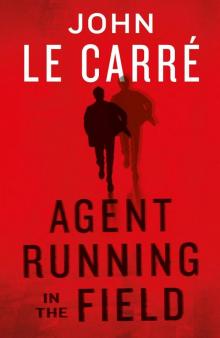 Agent Running in the Field
Agent Running in the Field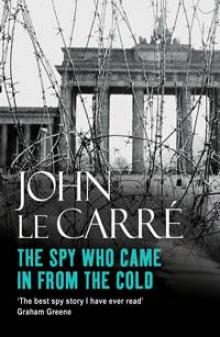 The Spy Who Came in from the Cold s-3
The Spy Who Came in from the Cold s-3 The Pigeon Tunnel
The Pigeon Tunnel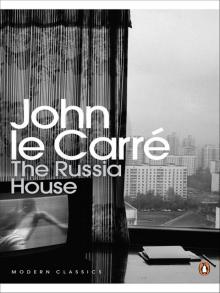 The Russia House - 13
The Russia House - 13 The Honourable Schoolboy
The Honourable Schoolboy Call For The Dead s-1
Call For The Dead s-1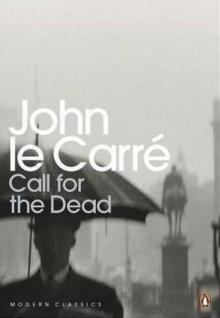 Call for the Dead
Call for the Dead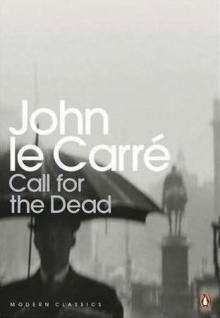 Call for the Dead - 1
Call for the Dead - 1